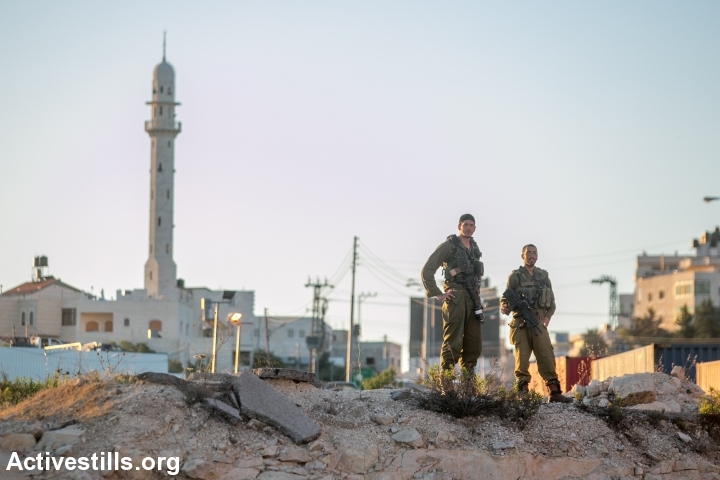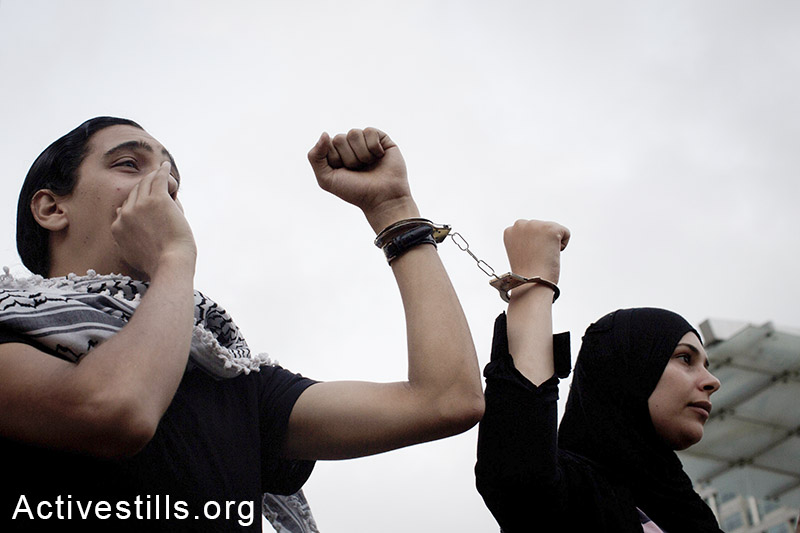Providing context may be taboo at a time when the entire country is focused on the fate of three kidnapped Israeli teens, but it is part and parcel of the story.
Since news broke Friday of the alleged kidnapping of three Israeli teenagers who study in a West Bank yeshiva north of Hebron the night before, media outlets and social media users have been gripping at straws to publicize new information on what has quickly become a national tragedy dominating Israel’s public discourse. The kidnapping and reactions to it, however, cannot be viewed in a vacuum.
The Israel Defense Forces on Sunday named the operation to locate the three, “Shuvu Achim” (Return, Brothers), and the IDF Spokesperson launched a social media campaign with the hashtag #BringBackOurBoys. Netanyahu asserted Sunday morning that Hamas is responsible for the kidnapping – although he provided no other information. Hamas thus far has not claimed responsibility and a Gaza-based spokesperson for the group called Netanyahu’s statement “stupid.”

Netanyahu also repeatedly declared that he also holds the Palestinian Authority and President Mahmoud Abbas directly responsible, even though the incident took place in areas under total Israeli control. He quickly used the incident to justify his position that peace cannot be negotiated with a Palestinian leadership affiliated with Hamas, for which he was attacked by the Israeli opposition. Netanyahu did not mention Israel’s long-standing security coordination with Palestinian security forces, unlike several other Israeli officials, who have come out saying they are pleased with the coordination over the last few days.
Hebron, a city of 160,000 Palestinians already under occupation, and which normally has about 600 IDF troops stationed in it, has been under complete lockdown for days now. An additional 2,000 or so troops have been deployed as part of the massive operation. Around 80 Palestinians, almost all Hamas members, some of them senior officials, were arrested overnight by the IDF in a massive raid. According to Haaretz military correspondent Gili Cohen, in addition to the 2,000 extra troops already deployed in Hebron area, the IDF on Sunday ordered a limited call-up of reserve forces to assist in the search operation.
But all of that has been widely reported.

Incidents that received less or no coverage in Israeli media are reports that settlers threw barrages of stones at Palestinian cars over the weekend, damaging 15 cars and injuring three people. In the south Hebron hills, some 30 settlers reportedly invaded the Palestinian village of Susya, threw stones at homes and attempted to attack a 13 year old.
Many in the twittersphere have responded to the IDF campaign by hijacking the hashtag #BringBackOurBoys with statistics and photos of Palestinian children detained or killed by Israel, including a Palestinian child killed in an Israeli airstrike in Gaza this week and the hundreds (191) administrative detainees currently in Israeli prisons without charge or trial, all of whom the online activists are adamant to “bring back” as well. Since April, some 120 of them have been on hunger strike (that’s 53 days now) and there have been solidarity protests throughout the West Bank and Israel on a regular basis.

For Palestinians, this is a national tragedy and a major component of the macro national tragedy that comprises daily life under Israeli military rule and occupation, now 47 years old. It is no secret that holding Israelis hostage is a proven tactic Palestinians — and others — have used to secure the release of prisoners held by Israel, just like what took place recently in the deal to free captured soldier Gilad Schalit.
***
Providing this context may be taboo at a time when the entire country is focused on the fate of three kidnapped Israeli teens, but it is part and parcel of the story here. It is an important reminder to Israelis that we are in a constant state of war and Palestinians under constant occupation – no matter how much they are largely immune to it due to the imbalance of power that protects them on a day-to-day basis.
That is why for example, when the IDF uses another hashtag in its campaign, such as #LifeUnderTerror, I cannot help but think how easily this could just as well apply to Palestinians (Palestinian activists also quickly hijacked this hashtag). Think of the 80,000 Palestinian residents of East Jerusalem who have been living without regular running water for months now. Or remember that exactly one month ago, on Nakba Day, two Palestinian teens were killed by IDF fire during protests in Beitunia while presenting no immediate threat to anyone. Although no conclusive results have been formally published, an autopsy on one of the teens, Nadim Syam Nuwara, confirmed live ammunition killed him, casting serious doubt on IDF claims that no live bullets were fired. No one can bring those boys back home to their parents and it is doubtful whether justice will ever be brought to their families.
I, of course, want the three Israelis, Eyal Yifrah (19(, Gilad Shaer (16) and Naftali Frenkel (16) to return home safe and sound. But it is important to remember that Israelis are not the only ones suffering a national tragedy, and that incidents like this do not happen in a vacuum.
Related:
West Bank kidnapping: The Palestinian unity government’s first real test
Three Israeli teens feared kidnapped in the West Bank

